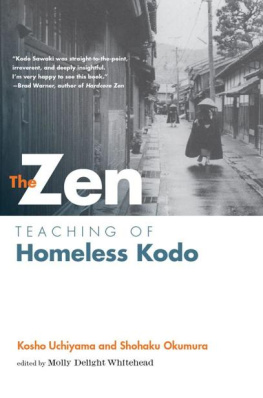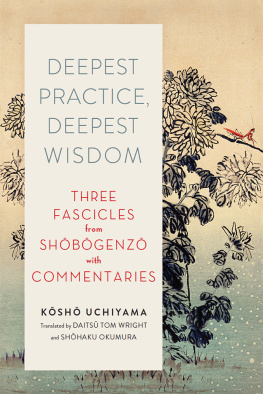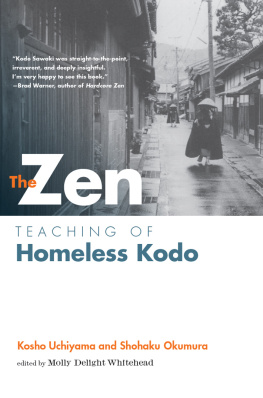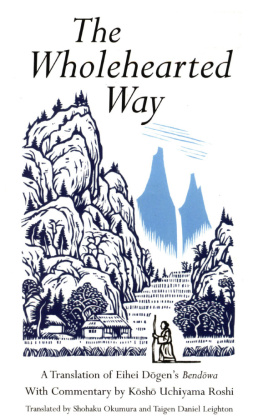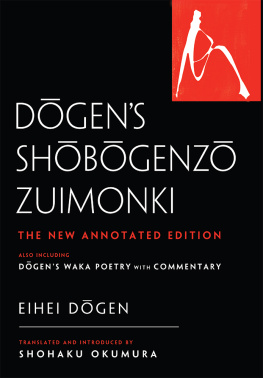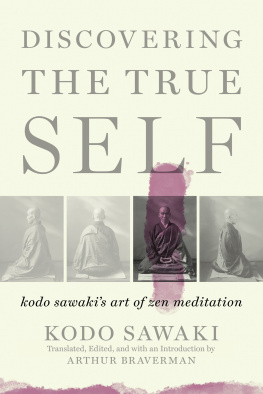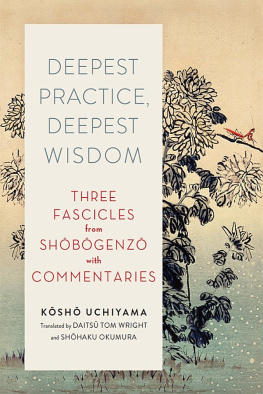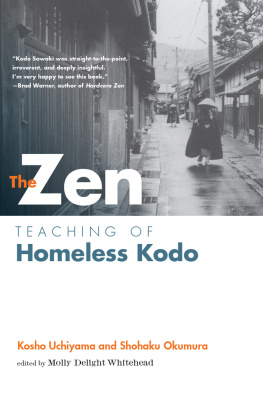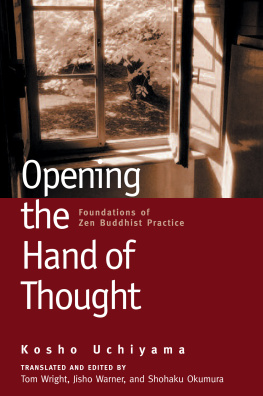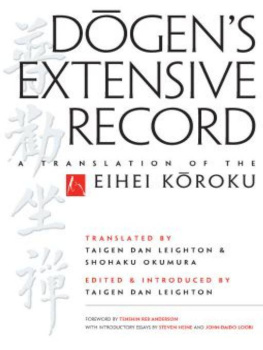Advance Praise of The Zen Teaching of Homeless Kodo
Shohaku Okumura is a true treasure for contemporary American Zen, humbly but clearly expressing this noble legacy.
Taigen Dan Leighton, author of Zen Questions
Sawaki Roshis profound and simple Dharma expression comes from the depth of his empty, open heart, like the light of the sun or the flow of a river, pure and unhindered, touching and awakening that same place in ourselves.
Mel Weitsman, founder of Berkeley Zen Center
Clear and conversational. The variety among the three voices encourages the emergence of a fourth: yours, as you browse and come back again and again.
Jisho Warner, founder of Stone Creek Zen Center
Studying this book is a rare chance to sit with three Zen masters as they bring forth the Dharma with their unique family stylecompassionate, blunt, humorous, wholeheartedeach one devotedly helping the other and helping us to wake up.
Eijun Linda Ruth Cutts, Central Abbess of the San Francisco Zen Center
Prepare yourself to be challenged and inspired. In Shohaku Okumuras vibrant new translation of writings from his Dharma grandfather Kodo Sawaki, we can directly taste the power of authentic Zen. Equally precious are the commentaries from Sawaki Roshis Dharma heir and Okumuras teacher Kosho Uchiyama, along with Okumuras own commentaries. The lineage of Homeless Kodo is alive and well, and available to us all through this delightful book. Melissa Myozen Blacker, coeditor of The Book of Mu
To Kodo Sawaki, homelessness was more than not having a temple or a house; it described how life is:...all human beings without exception are in reality homeless. In The Zen Teaching of Homeless Kodo, three generations of Zen teachers explore the nature of that reality with an honesty that is direct, approachable, and often disconcerting. Sawakis blunt statements, recorded by his student Kosho Uchiyama, and explained by Uchiyamas student Shohaku Okumura, offer a modern approach to Buddhism and Zen that is free of lofty perceptions of spiritual practice. Their teachings point to fundamental human feelings of insecurity and inadequacy and the cultural mindsets that reinforce and cause us to be trapped by them. As readers discover, recognizing this reality can also open up an underlying freedom.
Teijo Munnich, Great Tree Zen Womens Temple
The Zen Teaching of Homeless Kodo
Kodo Sawaki | 
|
Kosho Uchiyama | 
|
Shohaku Okumura | 
|

Hit the road with one of the most important Zen masters of the twentieth-century.
Eschewing the entrapments of vanity, power, and money, Kodo Sawaki Roshi lived a traveling and homeless life, going from temple to temple, student to student, and never straying from his chosen path. With razor-sharp wit and penetrating insight, he cuts through trivial preoccupations like a sword through tissue paper. Always clear, often funny, he jolts us into awakening.
Kosho Uchiyama expands and explains his teachers wisdom with his commentary, drawing parallels between Zen teachings and Western philosophy. Shohaku Okumura adds his own insight, grounding his teachers power and sagacity for the contemporary practitioner. Through this book, experience the timeless, practical wisdom of three generations of Zen masters.
A wonderful opportunity to catch a glimpse of a vibrant lineage in action and an invaluable contribution to all schools of meditative living.
Larry Rosenberg , author of Breath by Breath
Provides pure, rich examples of living the Buddha Way by three renowned Zen practitioners, replete with teachings that directly point to wholeheartedly living our lives.
Steve Hagen , author of Buddhism Plain and Simple
Kosho Uchiyama (191299) studied Western philosophy at Waseda University and became a Zen priest under Kodo Sawaki Roshi. He wrote over twenty books on Zen, including Opening the Hand of Thought: Foundations of Zen Buddhist Practice .
Shohaku Okumura is a Soto Zen priest and Dharma successor of Kosho Uchiyama Roshi. He is the former director of the Soto Zen Buddhism International Center in San Francisco. He is the author of Living by Vow and Realizing Genjokoan .
This new translation is humbly dedicated to
Somon Kodo Daiosho
on the occasion of the fiftieth anniversary
of his passing away
and
Doyu Kosho Daiosho
on the occasion of the seventeenth
anniversary of his passing away.
Without their teachings and examples,
I could not have found a positive and
creative way of life.
Nine prostrations,
Shohaku Okumura
Publishers Acknowledgment
The publisher gratefully acknowledges the generous contribution of the Hershey Family Foundation toward the publication of this book.
Contents
Kosho Uchiyama
Kosho Uchiyama
Shohaku Okumura
There may be no better example of a reckless vow than promising to edit a book. No matter how many times one reads a manuscript with the precise attention thats a kind of love, mistakes will escape. Id like to say perfection isnt the goal, but perfection has to be the goal, never mind its impossibility. This paradox lends our vows their bittersweet beauty: we strive wholeheartedly for ideals we know we can never reach, accepting failure more or less gracefully from the start.
Here my mission was to help the Dharma express itself as clearly and meaningfully as possible through three generations of a Zen lineage. My favorite aspect of this book is its prismatic reflection of a single truth through the distinct characters, experiences, and voices of three teachersthe universal manifesting through the particular, as always.
Im honored to have been part of this effort, which gave me a tangible way to express my gratitude to my teacher, Shohaku Okumura, and to our lineage. Across divides of culture and time, I feel a resonance with Kodo Sawaki Roshi, most of all because of his homelessnesshis skepticism of institutions, religious and otherwise. I believe that for Sawaki Roshi spiritual practice had nothing to do with signing on to a particular dogma, but instead meant shouldering responsibility moment by moment for the truth and vitality of ones own life, intimate with all things.
Along with devotion and responsibility, life asks trusttrust in what Dogen Zenji called total function. In the end, an editor has to trust the words themselves, the truth behind them, and the earnest intentions of readers, then take a deep breath and let the book have its life. May you enjoy it!
My thanks to those who kept me on path at the beginning of my practice: Leslie James, Diana Gerard, and Norma Fogelberg. To Christopher Stillson for his unwavering faith and generosity of spirit. And to the friends who fed and sheltered me in my homeless days as a priest in Bloomington, Indiana: Peiwei Li and Arjan Vermeulen, Alexis Wreden and Robert Fakelmann, Barbara Moss and Bob Meadows, Beth and Tom Hollingsworth, Brian Flaherty, and Yuko Okumura.
I dedicate my work here to my parents, Joan and Jeff Whitehead, who taught me to love wordsthe right ones, in the right order, and not too many of them.

